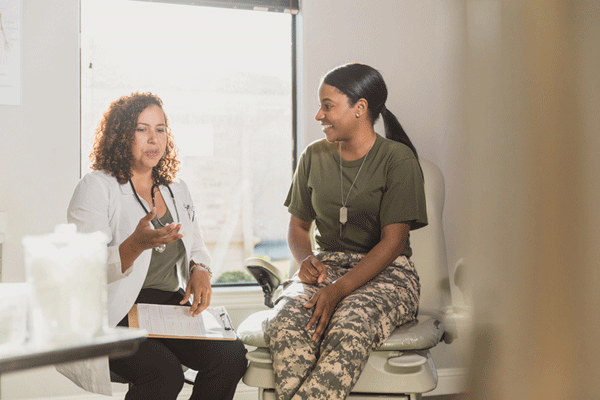During field exercises at the U.S. Army’s National Training Center in the deserts of Fort Irwin, California, and while deployed for medical exercises, Maj. Melody Nolan found herself in situations where there either wasn’t a bathroom she could use or the available bathrooms were unsanitary.
Some locations required Nolan and other soldiers to go to the bathroom only if their battle buddy could accompany them, even if it was during the middle of the night.
“I would often plan my water intake to limit trips to the bathroom and try to avoid getting up frequently at night to go,” Nolan said.
She wasn’t alone. A study published in Military Medicine found that limited access to bathroom facilities caused servicewomen to restrict their drinking and avoid urinating in deployed situations.
Not drinking enough fluids and holding in urine for long periods of time were necessary measures in some cases, but those behaviors are also common causes of urinary tract infections (UTIs).
Deployed conditions create risk of UTIs
A UTI is an infection that affects any part of the urinary system, including the kidneys, ureters, bladder and urethra. According to the Mayo Clinic, most infections occur in the lower urinary tract, meaning the bladder and urethra. In severe cases, untreated UTIs can lead to kidney infections and complicated bladder infections.
Women and people with female biology are more likely to develop UTIs in general than men, and if they’re in the military — particularly serving in a harsh environment — they are at even greater risk because of their working conditions.
The Armed Forces Health Surveillance Center monitored active-duty troops from 2000 to 2013 and found that 30.4% of women were diagnosed with at least one UTI during that 14-year period, while only 3.5% of men experienced a UTI.
People with female biology are more prone to developing UTIs because they have shorter urethras, which allows bacteria to reach the bladder without traveling very far.
Many medical studies, as well as the Army itself, attribute these infection rates to a lack of privacy during deployments or field exercises, as well as the lack of facilities for personal hygiene, including showers, handwashing stations, laundry services and toilets. If toilets are available, they may not be easily accessible or clean.
On top of that, there’s the added difficulty of heat, sand, dirt and dust in many deployed areas that make it nearly impossible for troops to stay clean.
How military women and people with female biology can prevent infection
Studies have found that UTIs contracted during deployments can place a burden on the military health system and have a negative effect on military readiness.
Untreated gynecologic conditions were the reason for one out of every 20 medical evacuations from military theaters of operations from 2008 to 2013, according to a study by the Association of Military Surgeons of the United States.
And the Military Medicine study mentioned above stated that gynecological issues, including UTIs, can harm the health of service members, which affects the unit and the overall mission.
Nolan, an Army gynecologist, now advises other service members about what they can do to avoid UTIs and other infections.
“Educating women in the military on the signs and symptoms of UTIs is incredibly important, and can help reduce complicated infections by empowering them to know when to ask for help,” she said.
To prevent infection, Nolan suggests that women and people with female biology wash their hands before and after using the toilet and changing any period products. When possible, they should avoid holding in urine and empty their bladder as soon as the urge occurs. They should also drink plenty of fluids, preferably water, to flush bacteria out.
In situations where those practices aren’t possible, Nolan recommends using hand sanitizer or unscented baby wipes to lower the risk of infection during deployments or field exercises. Wearing cotton underwear, which is breathable and absorbent, can also help prevent infections, she said.
Don’t hesitate to get care
It’s important to know what symptoms to look for. The signs of a UTI include burning or pain while urinating; a strong urge to urinate that doesn’t go away; or pelvic pain, especially around the area of the pubic bone. People experiencing a UTI may have urine that either looks cloudy, smells strongly, or is tinged red or pink from blood.
Nolan thinks that servicewomen and service members with female biology who have symptoms typically don’t have problems reporting them when they’re in a garrison and have access to their medical providers. However, when they’re in the field or otherwise not located near a trusted provider, there might be some hesitancy to mention it.
“I do think there [is hesitancy] in the field or if they are not located near an experienced healthcare provider while deployed in combat or an austere environment,” Nolan said. “It can be embarrassing to bring up.”
Embarrassing or not, it’s important for anyone who has these symptoms to seek medical treatment — because they may need prescription medication to make sure a UTI doesn’t turn into something more serious.















